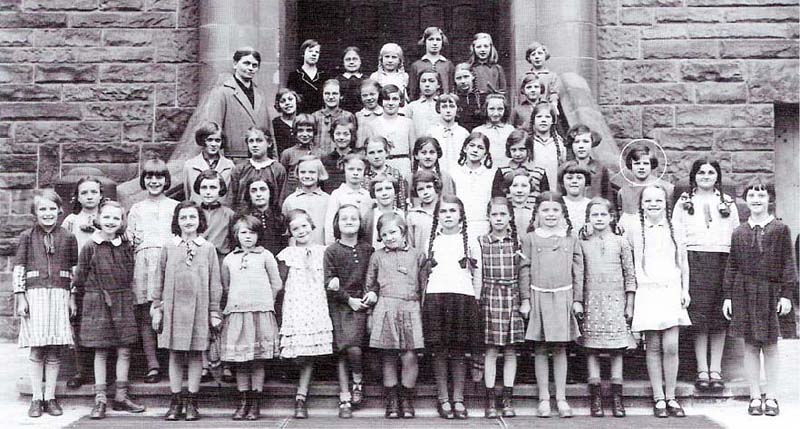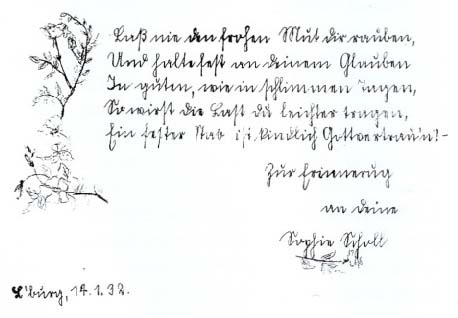

[ Read more | Deutsche Version ]
From the booklet for the 100-Year Jubilee, 1907-2007 100 Years of the Anton Bruckner School.
Plese click here for a PDF version of these selections.
and her time in the former Public School for Girls at the “Schulbückele” (known today as the ABS)
I think we all know the story of Sophie Scholl, her brother Hans, their efforts in the “White Rose” and their death. What a large roll she and her brother play even today in the historical knowledge of people of our country can be seen in the fact that in a large survey by (television station) ZDF in 2003 on the question, “Who are the greatest Germans?” They landed in 10th place out of 1,600 reponses. In 2005, an incredibly impressive film about Sophie’s last days was even nominated for an Oscar.
In 2004, as our daughter Anne started school at the ABS and I had the time once to look around in the foyer when picking her up, I was utterly stunned to discover this little framed paper with a small photo of Sophie Scholl, under which it was casually mentioned that for two years, she had been a pupil at the school now known as the ABS. There’s a photo of her with her class on the big steps of our school, which look exactly the same today… She ran through those doors and up and down those stairs, exactly like our Anne and her friends do today. This is not an abstract story, Sophie Scholl actually spent part of her life in this building. I know of no comparable story involving Anton Bruckner!
I think that Sophie Scholl is a really extraordinary individual in recent German history and in my opinion, the children of the ABS are not too young to learn about her and her short life. It will leave a lasting impression on them.
I expressly ask the powers that be to please take into consideration whether the name of the Anton Bruckner School couldn't be changed to the Sophie Scholl School – a name which this school could carry with great pride and to whom an actual historical connection exists!
Sabine Rossow-Braun
Sophie was born, the daughter of the mayor, in Forchtenberg near Öhringen (Germany) on May 9, 1921. She had four siblings.
She started school in Forchtenberg in 1928. In the summer of 1930, her family moved to Ludwigsburg for two years and Sophie attended the school then known as the Public School for Girls at the “Schulbückele,” today known as the Anton Bruckner School.
Her family had an apartment at number 7 Schillerplatz, on the corner of Mylius Street.
It is said that the Scholl children very much enjoyed playing with their friends at the “Favorite Gardens”. Sophie could already draw quite well and left behind very lovely illustrations in poetry albums.
The Scholl family moved again, to Ulm, in the spring of 1932. Her father was later the “senior” mayor of this city, from 1945 to 1948.
At first, Sophie, as well as her brother Hans, with whom she was especially close, were enthusiastic about the ideals of the National Socialists and in 1933 became a member of the German Girls’ Organization (Bund deutscher Mädchen).
However, in 1938, she resigned her position as Girls’ Leader after false accusations against three of her siblings led to their arrest and detention by the Gestapo, and they had to remain in jail for several weeks. She began to distance herself inwardly from Nazism.
Ater graduation from secondary school in 1940, she began a program of training to be a kindergarten teacher. She finished her exams in 1941, around which time she also finally left the BDM.
A co-worker of her father’s accused him of making remarks critical of the Nazis. Sophie had to witness her father also being sent to prison and later, after his release, how he was forbidden to work. Many people cite these experiences as turning points for Sophie. She decided to fight back. Her statement is reported to have been, “Enough. I’m taking action.”
On her birthday in 1942, she began to study biology and Philosophy at the University of Munich.
She and her brother Hans were members of the resistance group, the White Rose (die Weiße Rose), which, in protest of the Nazi dictatorship, produced several flyers and distributed them as widely as possible.
On February 18, 1943, she and her brother were discovered distributing flyers at the University of Munich. They were interrogated by the Secret Police (Geheimen Staatspolizei, or Gestapo) and on February 22, they were sentenced to death. They were executed on the same day.

Class photo of class 4b of the Lutheran Girls' School, Ludwigsburg. Sophie Scholl's head is in circled in white.

From the booklet for the 100-Year Jubilee, 1907-2007 100 Years of the Anton Bruckner School.
Plese click here to download a PDF version of these selections.
Never let yourself be robbed of cheerful courage,
And hold fast your faith
On good days, as well as bad,
So will your burden be lighter,
A firm staff is childlike trust in God! –
To remind you
of your
Sophie Scholl
L’burg, 1-14-32
Pre-manipulated photo of rose in header art courtesy of pdphoto.org